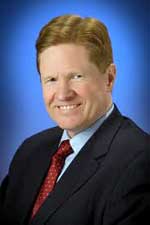Guest Editorials
BY PETER SPRIGG | JUNE 1, 2011
Homosexual Adoption Cloaks Sneak Attack on Religious Liberty
 The issue of homosexuals adopting children has been in the news recently in several states. It is an issue closely related to the debate over same-sex "marriage," although there is a bit of a chicken-and-egg question about which has priority (do homosexuals want adoption privileges to pave the way for "marriage," or do they want "marriage" to make it easier to adopt and/or raise children - or both?).
The issue of homosexuals adopting children has been in the news recently in several states. It is an issue closely related to the debate over same-sex "marriage," although there is a bit of a chicken-and-egg question about which has priority (do homosexuals want adoption privileges to pave the way for "marriage," or do they want "marriage" to make it easier to adopt and/or raise children - or both?).
However, the battle over homosexual adoption is becoming one battleground in a war over something that is (if it were possible) even more important than marriage - namely, the future of religious liberty in America.
Recently there has been some good news for social conservatives. Arizona's legislature passed and sent to Gov. Jan Brewer a bill that would give married couples preference over single people in adoption, at least as a tie-breaker when all other factors are equal. This bill is based on the common-sense idea that children do best with a mom and a dad, and says nothing about sexual orientation. However, since same-sex couples are barred from "marrying" under Arizona's constitution, it creates a preference (however slight) that practicing homosexuals would not be able to take advantage of.
There was good news from the courts as well, as the U.S. Court of Appeals for the Fifth Circuit ruled that two homosexual men who adopted a Louisiana-born child in New York were not entitled to a revised birth certificate listing both men as the child's parents, because Louisiana law does not permit unmarried couples to adopt. Family Research Council had filed a brief in support of the state in this case. The court endorsed findings from Child Trends, a research organization that studies family structure, to the effect that "marriage, when compared to cohabitation, 'is associated with better outcomes for children,' since marriage is more likely to provide the stability necessary for the healthy development of children."
It was in Virginia and Illinois, however, that the issue of religious liberty came to the forefront. In Virginia, it took a conservative State Delegate, Bob Marshall, to draw attention to the fact that state bureaucrats were attempting to insert a regulation forcing adoption agencies - including private, faith-based ones - to accept homosexual individuals or couples as adoptive parents, even if it is contrary to their religious convictions or best judgment to place children in such homes. After receiving over a thousand negative comments and only 33 positive ones, the state's social services board withdrew the proposal.
Meanwhile, in Illinois, the state senate narrowly rejected legislation that would have explicitly protected the right of faith-based adoption agencies to make placements in accordance with their own faith-based values. The bill was actually sponsored by Democratic Sen. David Koehler, who also led the successful push for adoption of "civil unions" for same-sex couples. Koehler had reportedly promised to work to alleviate the concerns about religious liberty raised by some of his colleagues during the civil unions debate.
The issue was not whether homosexuals in Illinois could adopt - a court guaranteed them that right in 1995. Nor was the issue whether there are adoption agencies in Illinois willing to serve them - the state has over 50 such agencies, only three of which were faith-based ones seeking protection.
Opponents of the faith-based protections worried that some needy children might miss out on finding an adoptive parent if these agencies are permitted to rule out some applicants. But it seems that risk would be far higher if the faith-based agencies are driven out of business altogether. That is exactly what happened to Catholic Charities following the legalization of same-sex "marriage" in both Massachusetts and the District of Columbia.
Koehler said, "I'm not sure how many gay couples would want to go to an organization that didn't honor their lifestyle choices in the first place."
Sen. Koehler is naive about the tactics of the homosexual movement. There are some activists who would deliberately go to such an organization, precisely so that they could file a lawsuit and force the organization to either bend the knee to political correctness or go out of business.
To the extent that liberal activists concede a right to religious liberty at all, it is a narrow, "four walls" freedom that says you can do what you want within the four walls of a church or your home - but once you step out the door, you have no freedom.
This cramped view of religious liberty is not the one our founding fathers envisioned.
Peter Sprigg is senior fellow for family policy studies at the Family Research Council.




